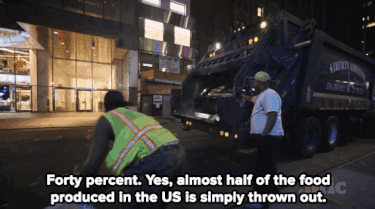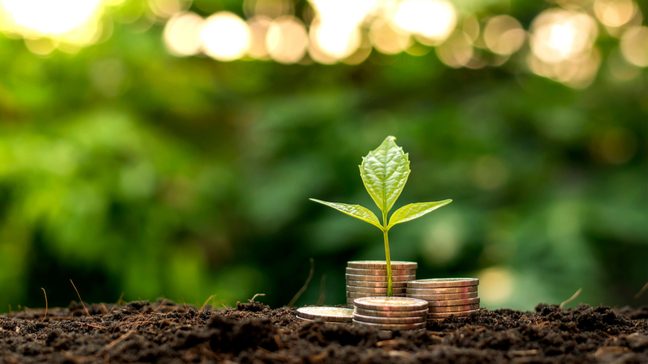You don’t have to be an environmental scientist to want to help preserve our planet. With a few small changes, you can start making more eco-friendly decisions with your money.
Here are 12 ways to go green with your finances today.
What’s Ahead:
- 1. Invest in green stocks and funds
- 2. Use a green bank or credit union
- 3. Get an eco-friendly credit card
- 4. Make your home more energy-efficient
- 5. Consider a green car
- 6. Drive less and drive smart
- 7. Replace disposables with reusables
- 8. Avoid fast fashion
- 9. Minimize your food waste
- 10. Eat less meat
- 11. Start an eco-friendly side hustle
- 12. Donate to environmental charities
- Summary
1. Invest in green stocks and funds
Green investing is a popular way to make your money work for the environment. It often includes building a portfolio made up of companies with strong environmental, social, and governance (ESG) values.
You can also invest in green funds or green ETFs, which are portfolios of companies that have a positive environmental impact.
For example, Empower is one of the best robo-advisors for green investing. It has low fees and plenty of socially responsible investing (SRI) portfolios to match your goals and values.
(Personal Capital is now Empower)
Read more:
- 4 best robo-advisors for socially responsible investing
- Socially responsible investing: how to become a conscious investor
2. Use a green bank or credit union
Supporting eco-friendly initiatives doesn’t stop at where you invest your money. You can also support the environment by using a bank or credit union that has sustainable practices.
Look for a financial institution that uses paperless banking, funds renewable energy projects, avoids fossil fuels, or has other green policies in place.
And if you want to really up the ante, you can make sure the institution is a Certified B Corporation (which means they’re legally required to follow certain sustainability and diversity requirements).
Some of my favorite green banks are:
- Aspiration Bank: Has spending and saving accounts, as well as investment accounts with fossil fuel-free portfolios.
- Ando Money: On a mission to fight climate change. Accounts come with unlimited 1.5% cash back on purchases, free overdraft protection, and early paydays.
- BankPurely: Plants a tree every time someone opens a SavingPurely account.
Read more:
- 15 banks and credit unions putting social responsibility first
- Ethical banking: what you should know about socially responsible banks
3. Get an eco-friendly credit card
With a green credit card, you can help the planet while also earning rewards for yourself.
There are now a few different companies that offer eco-friendly credit cards. Most reward you for shopping with green businesses or help offset your carbon footprint.
One of the best green credit cards is the Aspiration Zero Credit Card. It earns 1% cash back and plants a tree every time you make a purchase to help neutralize your carbon footprint.
4. Make your home more energy-efficient

Source: giphy.com
Another way to turn your money green is to make your home more energy-efficient. There are tons of simple ways to do this:
- Install LED light bulbs.
- Weatherstrip your doors and windows.
- Unplug electronics when you’re not using them.
- Turn the faucet off when you’re not using it.
- Install low-flow fixtures in your home to save even more water.
- Always run your dishwasher and washing machine when it’s full.
- Air dry your clothes instead of using the dryer.
- Install solar panels.
You can even get a tax credit for making certain energy-saving improvements to your home.
5. Consider a green car
If you’re in the market for a new car, look into fuel-efficient or electric models. Not only will you save money on gas, but you’ll also be doing your part to reduce emissions. Plus, you may be eligible for a tax credit if you buy a qualified electric vehicle.
Read more: The cost of driving a hybrid
6. Drive less and drive smart
Speaking of driving…
When you do need to use a car, there are a number of ways to save money and be more eco-friendly. This includes carpooling, using public transportation, and biking or walking when possible, all of which can help reduce your carbon footprint.
And when you do drive, you can save fuel and money by driving the speed limit, keeping your tires inflated, and combining errands into one trip.
7. Replace disposables with reusables

Source: giphy.com
Another easy way to make your money green (and reduce your impact on the environment) is to replace disposables with reusables.
For example, you could:
- Use a reusable water bottle instead of buying bottled water.
- Bring a reusable mug to the coffee shop.
- Carry stainless steel straws with you so you don’t have to use plastic ones.
- Bring your own bags to the grocery store.
- Invest in reusable menstrual products like cups, cloth pads, and period panties.
These are just a few examples — there are many more ways to reduce your impact by switching to reusables. And the best part is, they often save you money in the long run. So if you’re looking for an eco-friendly budgeting hack, this just might be it!
8. Avoid fast fashion

Source: giphy.com
The fast fashion industry is one of the biggest polluters in the world. The production of clothing uses a lot of resources, and most of it ends up in landfills. When you buy from fast fashion brands, you’re contributing to this cycle of waste.
Use these two alternatives instead:
Switch to slow fashion
Instead, opt for slow fashion brands that focus on sustainable and ethical production.
Some of the best slow fashion brands are Reformation, Everlane, and Girlfriend Collective.
You may pay more upfront for a single item when you shop slow fashion, but these items are built to last. And they often end up being cheaper than fast fashion brands when you factor in cost per wear. (This is an item’s price divided by how many times you plan on wearing it.)
Shop secondhand
You can find high-quality secondhand clothing at thrift stores, consignment shops, and online. It’s a great way to repurpose high-quality items that have already been produced and keep them out of the landfill.
Read more: Conscious consumerism: how to spend your money with intention
9. Minimize your food waste

Source: giphy.com
A four-person family wastes about $1,500 a year on uneaten food. This food then rots in a landfill for decades. (Did you know it takes 25 years for lettuce to decompose?!)
One of the best ways to reduce your impact on the environment — and develop more eco-friendly budgeting habits — is to minimize your food waste.
Plan your meals so you use all the food you buy, and compost any scraps. You can even save money by turning leftovers into new meals.
Read more: How I used local farms to slash my food bill
10. Eat less meat
Meat production is a major contributor to greenhouse gas emissions, so eating less of it can help the environment. If you’re not ready to go completely vegetarian or vegan, try incorporating more meatless meals into your diet.
Read more: The true cost of going vegan
11. Start an eco-friendly side hustle
There are a number of ways to make extra income while also helping the environment. You could start a composting business, offer carpooling services, or sell eco-friendly products. If you’re passionate about sustainability, there are plenty of opportunities to make a difference — and a profit.
Read more: Side hustle ideas: 35+ ways anyone can earn more money on the side
12. Donate to environmental charities
Last but not least, you can make your money green by donating some of it to environmental charities. There are a number of organizations working to protect our planet, and your donation can help them continue their work.
Some of the top environmental charities include the Nature Conservancy, the Sierra Club, and the Environmental Defense Fund.
When you donate to these organizations, you’ll be supporting their efforts to protect our planet. And you’ll be making a difference in the fight against climate change.
Read more: You’re not too broke to give to charity (and 4 other reasons to give)
Summary
Making even just a few of these changes can help you live a more eco-friendly lifestyle. And as you start making greener choices with your money, you’ll be doing your part to protect our planet for future generations.
Featured image: MEE KO DONG/Shutterstock.com


